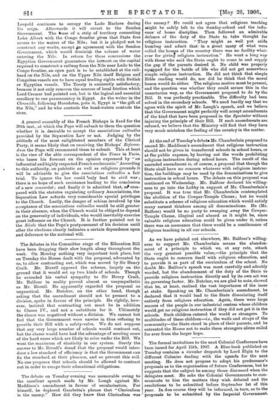A general assembly of the French Bishops is fixed for
the 30th inst., at which the Pope will submit to them the question
whether it is desirable to accept the associations cultuelles provided by the Separation Law or not. Judging by the attitude of the most enlightened members of the Clerical Party, it seems likely that on receiving the Bishops' Referen- dum the Pope will recommend them to submit. This at least is the view of the able correspondent of the Times in Paris, who bases his forecast on the opinion expressed by " an influential and highly respected French ecclesiastic." According • to this authority, on patriotic as well as religious grounds it will be advisable to give the associations cultuelles a fair trial. To ignore the law could only lead to civil war ; there is no hope of such resistance leading to the conclusion of a new concordat ; and finally it is admitted that, at? com- pared with the statutes regulating ordinary Associations, the Separation Law accords very considerable special privileges to the Church. Lastly, the danger of schism involved by the acceptance of the associations cultuelles would be still greater in their absence, when the Church would be obliged to depend on the generosity of individuals, who would inevitably exercise great influence on the Church. It is further pointed out in the Siecle that the Pope's postponement of his decision until after the elections clearly indicates a certain dependence upon and deference to the national will.










































 Previous page
Previous page